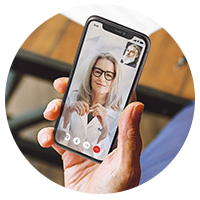Sometimes, we don’t realize that we are having trouble hearing. We may be used to it, or we may think it’s normal and that it’s just something we have to deal with. It doesn’t have to be this way. Sharper, clearer hearing exists and it’s available for you. Choose the Beltone Skoric location nearest you, from the UP to the Mitten. Our audiology and hearing aid solutions are here to help you hear well again.
Not sure if Beltone hearing aids from Beltone Skoric are right for you? If you answer “YES” to any of the questions below, call us +8884172130 for a FREE hearing test today.
- Do you have difficulty hearing in noisy situations?
- Do you hear, but have trouble understanding?
- Do you ask people to repeat themselves?
- Does your family complain that you play the TV too loudly?
- Have you been told that you speak too loudly?
Beltone Skoric Hearing Aid Center provides FREE hearing tests to help you determine whether Beltone hearing aids would benefit you.
- A study by Johns Hopkins and National Institute on Aging researchers suggests those with hearing loss are significantly more likely to develop dementia over time than those who retain their hearing.
- Research Conducted by The University of Michigan showed that those who treat their hearing loss had a 18% lower risk of dementia, 11% lower rate of anxiety, and a 13% lower risk of being treated for a fall-related injury.
- Medical professional report it is important for people aged 55 and over to have their hearing evaluated annually.
- Our hearing aid solutions include a copy of your hearing test that you can take home and provide your healthcare provider. This way, your test and results can be added to your medical records.
Beltone is a leader in the hearing care and hearing technology industries. For over 80 years, we’ve provided top-quality hearing aids in a variety of sizes and styles to patients around the world.
There are three types of hearing loss:
• Sensorineural hearing loss, which occurs when the inner ear or hearing nerve is damaged. It also occurs when hair cells within the cochlea are damaged.
• Conductive hearing loss, which happens when sound waves get stuck in the outer or middle ear and cannot carry all the way to the inner ear.
• Mixed hearing loss, which is a combination of sensorineural and conductive hearing loss.
Hearing aids include these primary parts:
• Microphone
• Speaker
• Amplifier
• Program button (on some models)
• Battery
• Volume control (on some models)
Hearing aids work by amplifying sound. This is done through a microphone, an amplifier, and a speaker. The microphone receives the sound and changes it into a digital signal, which the amplifier then picks up. The amplifier takes this signal and increases its strength. Then, the speaker takes this stronger signal and sends it into the ear.
Beltone makes digital hearing aids that are customized to your lifestyle, budgetary, and hearing needs. Our most popular hearing aid are BTE, or behind-the-ear, devices as well as custom hearing aids.
































